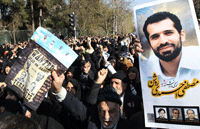
Iran blames France, Germany for scientist hits
Dubai, July 7, 2012
Iran's spy chief accused German and French intelligence agencies of involvement in assassinations of its nuclear scientists, sticking to a hard official line as sanctions imposed over its disputed atomic ambitions bite harder.
Iran has previously accused Israel, the US and Britain of plotting the killings to set back its uranium enrichment programme, which Western powers suspect is being used to develop nuclear weapons capability.
Intelligence Minister Heydar Moslehi spread the blame to France and Germany, after days of hawkish rhetoric and missile tests by Tehran that helped push benchmark Brent crude oil prices above $100 for the first time since June.
'In these two networks (involved in the assassinations) we saw connections with the information services in Germany, France, Britain, Israel, the US and regional intelligence agencies,' the state news agency IRNA quoted Moslehi as saying. He did not name the other countries.
In Berlin, a German government spokesman said: 'We decline to comment on such fanciful accusations.'
At least four scientists associated with Iran's nuclear programme have been assassinated since 2010, most recently in January this year. Washington has denied any role in the killings, while Israel has declined to comment.
Iran denies Western accusations of a covert agenda to develop a nuclear weapon, insisting it wants to stockpile enriched uranium solely to generate more electricity for a rapid growing population and radio isotopes for medical treatment.
Talks between world powers and Iran to resolve the standoff have so far failed to secure a breakthrough.
Oliver Thraenert, head of the think-tank unit of the Zurich-based Center for Security Studies, said that by accusing Western states of involvement in the assassinations, Moslehi could be signalling his opposition to any deal with them on the nuclear issue.
'It might be the case that behind these allegations is an internal fight about whether Iran should seek a compromise with the Western countries,' Thraenert said.
'If you accuse a nation like Germany or France of being behind these assassinations of Iranian nuclear scientists of course it is obvious that you cannot strike a deal with those countries,' he said.
Away from the international stage, Iran's nuclear programme has become a domestic political football, with hardliners criticising rivals for allegedly capitulating to the West.
In a poll conducted by the Islamic Republic of Iran News Network (IRINN) earlier this week, more than two thirds of respondents opted for 'the suspension of uranium enrichment in exchange for the gradual lifting of sanctions,' in answer to the question: 'Which way do you prefer to confront the unilateral sanctions of the West against Iran?'
Nearly 20 per cent favoured closing the Strait of Hormuz in retaliation and another 18 said Iran should resist the sanctions in order to safeguard its nuclear rights.
The number of respondents was not known. Analysing the results, IRINN said the poll 'by no means can reflect the views of all or even the majority of the revolutionary people of Iran'.
A European Union ban on the import, purchase or shipping of Iranian oil took effect on July 1 as part of widening international sanctions aimed at prodding Tehran into curbing enrichment and opening up to U.N. nuclear inspections.
Toughened US sanctions on Iran took effect on June 28.-Reuters







